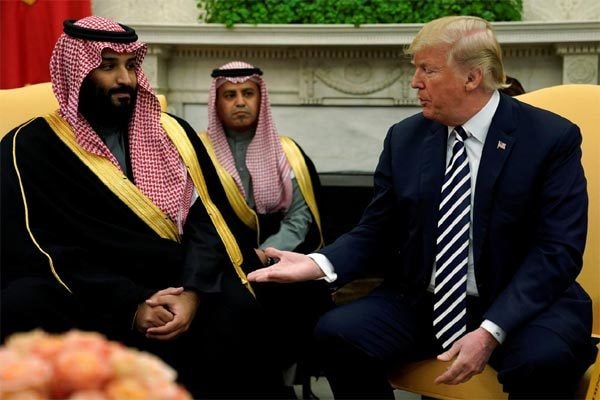US President cites 'rare' legal basis to 'bypass' Congress in dealing with Iran
The US Secretary of State revealed that the Trump administration has cited a rare legal basis to "bypass" Congress, selling up to billions of dollars in weapons to Arab allies to deal with Iran.
Speaking in Washington on May 24, Secretary of State Mike Pompeo confirmed that the Trump administration had invoked an emergency law to immediately approve arms deals worth up to $8.1 billion to Saudi Arabia, Jordan and the United Arab Emirates (UAE) to "push back against Iranian aggression" without congressional approval.
 |
| US President Donald Trump at a meeting with Saudi Crown Prince Mohammed bin Salman at the White House. Photo: Reuters |
Mr Pompeo said the delivery of the weapons, which included Raytheon precision-guided munitions and Javelin anti-tank missiles, could not be delayed any longer “at a time of increased volatility in the region”. The top US diplomat stressed that the volatility originated from Iran.
According to RT, normally, US arms sales to foreign countries require congressional review. However, the law Trump invoked allows the president to bypass legislative approval by declaring a state of emergency and citing “national security interests.” Washington used this tactic to sell weapons to Saudi Arabia before the 1991 Gulf War and the 2003 invasion of Iraq.
The US Congress has refused to approve arms sales to Arab allies, in part because of concerns about reports of civilian casualties in the Saudi-led bombing campaign in Yemen. In an attempt to reassure, Secretary of State Pompeo has insisted that such transfers are a “one-time move.”
Over the past several weeks, Washington has stepped up its actions to counter the "Iranian threat." The Pentagon has sent an aircraft carrier strike group, along with strategic bombers and air defense missiles, to the Gulf region, citing Tehran's campaign against Washington's interests and allies.
Before leaving for Japan, President Trump also announced that he had approved sending about 1,500 additional troops to the Middle East for "defense."
The new developments further escalate tensions between the US and Iran. Tehran officials are still determined not to give in to Washington's pressure and "vow" to respond strongly.

